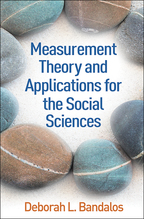Measurement Theory and Applications for the Social Sciences
Deborah L. Bandalos
This title is part of the Methodology in the Social Sciences Series, edited by Todd D. Little, PhD.
“For many years I found myself dissatisfied with an increasingly out-of-date classic psychometrics text but unwilling to adopt newer texts that did not provide the content coverage that I wanted for my psychometrics course. Deborah Bandalos’s measurement theory text finally let me lay that old classic to rest….[Measurement Theory and Applications for the Social Sciences] consistently presents the material in an accessible and understandable fashion without falling into the converse error of failing to convey the full complexity of the topics covered. Bandalos often begins chapters with personal anecdotes and maintains an engaging, conversational tone throughout. The chapters offer plentiful concrete examples….In a field in which the up-to-date texts tend to have either narrow or shallow coverage and the comprehensive texts tend to have fallen out of date, Bandalos’s text offers a welcome arrival that provides comprehensive and up-to-date coverage.”
—Psychometrika
“Highly readable—the statistical and measurement concepts are described so clearly that even students who think they hate math should be able to grasp the fundamentals. The writing style adds a personal touch to the technical content. Additional strengths are examples from a wide variety of disciplines, the breadth and depth of content coverage, and the step-by-step derivations of mathematical equations.”
—Lihshing Leigh Wang, PhD, Quantitative and Mixed Methods Research Methodologies Program, College of Education, Criminal Justice, and Human Services, University of Cincinnati
“This text is perfect for psychometrics courses for clinical graduate students, and is also a great introductory text for those who plan to become researchers. It provides equations and explains them for students with varying backgrounds in mathematics. This book meets my needs! It covers the more complex topics that I teach (generalizability theory, item response theory) with sufficient technical detail, but does so in a way that is accessible to most graduate students.”
—Marcus Boccaccini, PhD, Clinical Psychology Doctoral Program, Sam Houston State University
“A pleasure to read. Effective examples show me that the author really knows the information, and better yet, is able to communicate it well. Many tests and measurement texts are more successful in boring students to death, rather than teaching them, but not this one! It covers much of the material I teach in my course.”
—John Wallace, PhD, Department of Psychological Science, Ball State University
“Presents a thorough explanation of measurement theory and how it applies to test development in the educational, cognitive, and affective domains. Because of its practicality and comprehensiveness, this text will be extremely useful to any student or faculty member interested in measurement theory.”
—Scott L. Graves Jr., PhD, Department of Counseling, Psychology, and Special Education, Duquesne University
Table of Contents
I. Instrument Development and Analysis1. Introduction
2. Norms and Standardized Scores
3. The Test Development Process
4. Writing Cognitive Items
5. Writing Noncognitive Items
6. Item Analysis for Cognitive and Noncognitive Items
II. Reliability and Validity
7. Introduction to Reliability and the Classical Test Theory Model
8. Methods of Assessing Reliability
9. Interrater Agreement and Reliability
10. Generalizability Theory
11. Validity
III. Advanced Topics in Measurement Theory
12. Exploratory Factor Analysis
13. Confirmatory Factor Analysis
14. Item Response Theory, with Christine E. DeMars
15. Diagnostic Classification Models, with Laine P. Bradshaw
16. Bias, Fairness, and Legal Issues in Testing
17. Standard Setting
18. Test Equating
About the Author
Deborah L. Bandalos, PhD, is Professor and Director of the Assessment and Measurement Doctoral Program in the Department of Graduate Psychology at James Madison University, where she teaches courses in exploratory factor analysis, measurement theory, and missing data methodologies. Her research areas include structural equation modeling and the effects of item wording changes in instrument development. Dr. Bandalos has published articles and book chapters in the areas of structural equation modeling, exploratory factor analysis, and item and scale development. She is an associate editor of Multivariate Behavioral Research and a past associate editor of Structural Equation Modeling. In addition, Dr. Bandalos serves on the editorial boards of Psychological Methods and Applied Measurement in Education, is on the Executive Committee of Division 5 (Quantitative and Qualitative Methods) of the American Psychological Association, and has been elected 2019 President of the Society for Multivariate Experimental Psychology.Contributors
Deborah L. Bandalos, PhD, Assessment and Measurement Doctoral Program, Department of Graduate Psychology, James Madison University, Harrisburg, VirginiaLaine P. Bradshaw, PhD, Department of Educational Psychology, University of Georgia, Athens, Georgia
Christine E. DeMars, PhD, Center for Assessment and Research Studies and Department of Graduate Psychology, James Madison University, Harrisburg, Virginia
Audience
Students and instructors in education, psychology, management, sociology, and public health; behavioral and social researchers who want to improve their skills in measurement theory, scaling, test development, and test analysis.Course Use
Serves as a text in advanced undergraduate- and graduate-level courses in measurement theory or tests and measurement.The first and second printings included some errors, which are listed in this errata sheet. All errors will be corrected in future printings.
